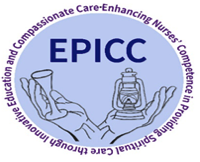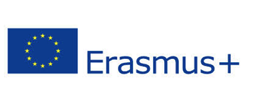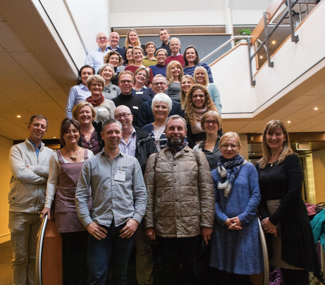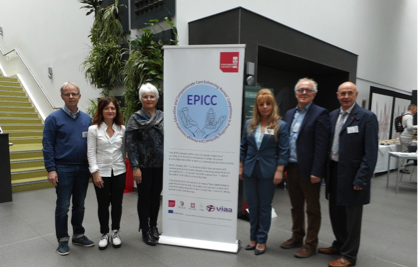 By Wilfred McSherry (Staffordshire University, England)
By Wilfred McSherry (Staffordshire University, England)
Dr Linda Ross (University of South Wales, Wales)
Dr Tove Giske (VID Specialized University, Bergen, Norway)
Dr Rene van Leeuwen (Christian University of Applied Sciences Viaa, Zwolle, Netherlands)
Dr Tormod Kleiven (formerly Diakonova University College, now VID Specialized University, Oslo,  Norway)
Norway)
The late Professor Donia Baldacchino
Dr Josephine Attard (University of Malta)
The mantra of patient-centred, dignified and compassionate care has become very prominent across health and social care. This is primarily due to the high profile cases reporting violations in dignity, quality and standards of care. Arguably, patient-centred care must address all dimensions of the person (physical, psychological, social and spiritual). Yet despite the concepts of spirituality and spiritual care receiving a great deal of attention and debate in the international healthcare literature, it is still a neglected dimension of care. The reason for this may include lack of clarity around its meaning, fear of accusations of proselytization and inadequate educational preparation.
Many nursing and midwifery professional regulatory and educational bodies require nurses and midwives, at point of registration, to be able to address the personal, religious and spiritual beliefs of their clients as part of person-centred holistic care. How learners acquire these skills, however, is less clear. Our research to date highlights that the teaching student nurses and midwives receive is important in their learning about spiritual/person-centred care, yet there is a great deal of inconsistency in how this topic is addressed within programmes of nurse education across Europe (Ross et al., 2014, 2016). Despite these inconsistences there is a great deal of innovation in the teaching of spiritual and person-centred care that needs to be captured, shared and built-upon to ensure nursing and midwifery students are equipped to address the holistic needs of the people they care for. This will ensure the nursing and midwifery workforce of the future is prepared to address some of the global challenges that are impacting on international nursing, midwifery and healthcare.
In order to address the inconsistencies identified in the preparation of pre-registration nurses and midwives to provide spiritual care, the six international partners (outlined above) developed the ‘Enhancing Nurses’ Competence in Providing Spiritual Care through Innovative Education and Compassionate Care’ (EPICC) project. The 33-month EPICC project is funded through an Erasmus+ KA2 Strategic Partnership Grant Agreement Number: 2016-1-UK01-KA203-024467
The aims of the project are to:
- Establish a sustainable network and partnerships where nursing and midwifery educators can share experiences, research and resources related to spiritual care, to inform their teaching
- Enable nursing and midwifery educators to acquire new knowledge/skills in the learning and teaching of personal, religious and spiritual aspects of person-centred care
- Review how personal, religious and spiritual aspects of care are currently addressed in a sample of Higher Education Institutions from across Europe
- Analyse current practice identifying factors and processes that enable or inhibit the teaching of these areas in nursing curricula
- Develop and test an innovative, dynamic and flexible Spiritual care Matrix for nurse education based upon international best practice and evidence which can be adopted by Higher Education Institutions (HEI) across Europe
- Identify strategies and develop resources to inform professional regulatory bodies and key stakeholders
- Ensure the project is informed by student and patient/public representatives.
 The project was launched at Staffordshire University in April 2017 (See link: http://www.staffs.ac.uk/news/eu-project-champions-the-spiritual-care-of-patients-tcm4293731.jsp) and a very successful teaching and learning event was held in Zwolle, Netherlands October/November 2017. In addition to the six partners, the EPICC project currently involves 23 nursing and midwifery educators from 16 European countries: Belgium, Croatia, Czech Republic, Denmark, Finland, Germany, Greece, Ireland, Norway, Poland, Portugal, Spain, Sweden, Turkey, UK, and Ukraine. EPICC has the potential to generate a rich insight into current educational practice, to enable the sharing of best practice and the development of a uniform approach to how personal, religious and spiritual beliefs are incorporated into nursing and midwifery curricula through the generation of guidance.
The project was launched at Staffordshire University in April 2017 (See link: http://www.staffs.ac.uk/news/eu-project-champions-the-spiritual-care-of-patients-tcm4293731.jsp) and a very successful teaching and learning event was held in Zwolle, Netherlands October/November 2017. In addition to the six partners, the EPICC project currently involves 23 nursing and midwifery educators from 16 European countries: Belgium, Croatia, Czech Republic, Denmark, Finland, Germany, Greece, Ireland, Norway, Poland, Portugal, Spain, Sweden, Turkey, UK, and Ukraine. EPICC has the potential to generate a rich insight into current educational practice, to enable the sharing of best practice and the development of a uniform approach to how personal, religious and spiritual beliefs are incorporated into nursing and midwifery curricula through the generation of guidance.
If you would like more information about the EPICC Project, please contact Professor Wilfred McSherry Project Lead (W.McSherry@staffs.ac.uk) or Mr Adam Boughey EPICC Project Manager (Adam.Boughey@staffs.ac.uk)
References
Ross L, Giske T, van Leeuwen R, Baldacchino D, McSherry W, Narayanasamy A, Jarvis P, Schep-Akkerman A. (2016) Factors contributing to student nurses’/midwives’ perceived competency in spiritual care. Nurse Education Today, 36, 445-451.
Ross L, van Leeuwen R, Baldacchino D, Giske T, McSherry W, Narayanasamy A, Downes C, Jarvis P, Schep-Akkerman A. (2014) Student nurses perceptions of spirituality and competence in delivering spiritual care: A European pilot study. Nurse Education Today, 34 (5), 697-702
